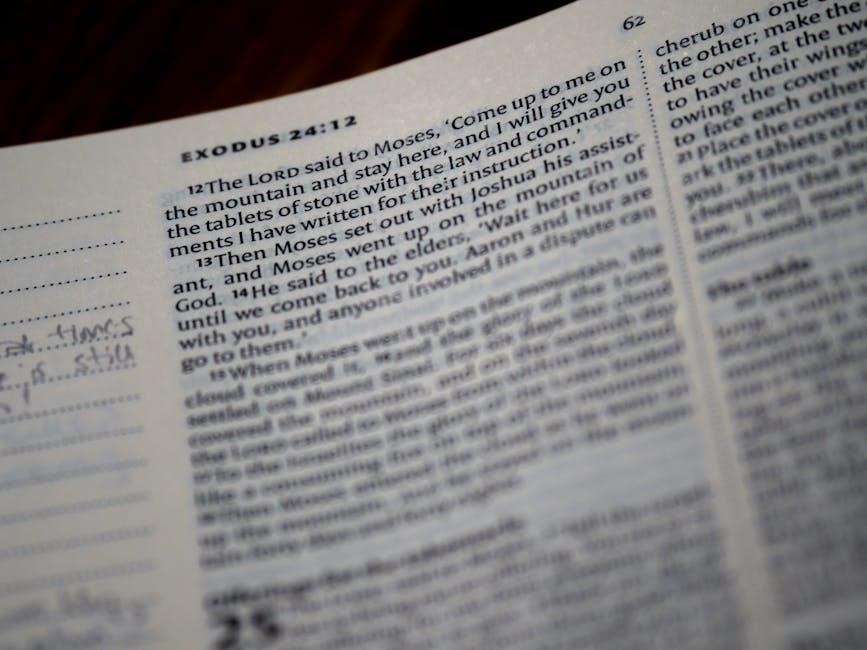
exodus pdf
The Book of Exodus is the second book of the Bible‚ recounting Israel’s journey from Egyptian slavery to covenant with God. It explores themes of deliverance and divine presence.
1.1 Overview of the Book of Exodus
The Book of Exodus is the second book of the Bible and the Hebrew Torah‚ detailing Israel’s liberation from Egyptian slavery. It begins with the Israelites’ oppression in Egypt and culminates in their covenant with God at Mount Sinai. The book is divided into three main sections: the deliverance from Egypt‚ the journey through the wilderness‚ and the establishment of the tabernacle. Key events include the Ten Plagues‚ the parting of the Red Sea‚ and the reception of the Ten Commandments. Exodus emphasizes God’s presence and redemption‚ shaping Israel’s identity as a holy nation. Its themes of freedom‚ faith‚ and covenant are central to Jewish and Christian traditions. The narrative also highlights Moses’ leadership and divine intervention‚ making it a foundational text for understanding God’s relationship with humanity.
1.2 Historical Context of the Exodus Story
The Exodus story is set in ancient Egypt‚ where the Israelites were enslaved for centuries. Historical records suggest that Egyptian pharaohs often exploited foreign labor‚ creating a plausible backdrop for the narrative. Archaeological evidence does not explicitly confirm the Exodus event‚ but scholarly debates continue about its historicity. The story reflects a period of transition for the Israelites‚ moving from slavery to nationhood under divine guidance. The Exodus is often dated to the New Kingdom period‚ around 1250 BCE‚ though exact timelines remain uncertain. The narrative emphasizes God’s intervention‚ miracles‚ and the establishment of a covenant‚ shaping Israel’s identity as a people chosen by God. This historical context underscores themes of liberation‚ divine presence‚ and the formation of a religious and cultural legacy that resonates deeply in Jewish and Christian traditions.

The Exodus PDF: Key Themes and Chapters
The Exodus PDF explores themes of divine deliverance‚ covenant‚ and freedom. Key chapters include the Ten Plagues‚ Red Sea parting‚ and the giving of the Ten Commandments‚ highlighting God’s power and Israel’s journey.
2.1 The Ten Plagues of Egypt
The Ten Plagues of Egypt‚ as detailed in the Exodus PDF‚ were divine punishments sent by God to compel Pharaoh to free the Israelites. The plagues began with water turning to blood‚ followed by swarms of frogs‚ lice‚ and flies. The fifth plague brought disease upon livestock‚ and the sixth covered Egyptians in painful boils. The seventh plague unleashed hail‚ while the eighth brought locusts to devastate crops. The ninth plague shrouded Egypt in darkness for three days. The tenth and final plague‚ the death of every firstborn son‚ was the most severe‚ leading Pharaoh to relent. These events showcased God’s power and solidarity with the oppressed Israelites‚ forming a cornerstone of the Exodus narrative.
2.2 The Parting of the Red Sea
The parting of the Red Sea‚ a pivotal event in the Exodus story‚ occurs as the Israelites flee Egypt. With Pharaoh’s army in pursuit‚ Moses‚ guided by God‚ raises his staff‚ and a miraculous wind divides the sea‚ creating a dry path. The Israelites cross safely‚ while the returning waters engulf the Egyptian forces. This divine intervention solidifies Moses’ role as a leader and reinforces God’s covenant with Israel. The event symbolizes liberation and divine deliverance‚ resonating deeply in Jewish and Christian traditions. Its depiction in films‚ like Ridley Scott’s Exodus: Gods and Kings‚ highlights its enduring cultural impact. The parting of the Red Sea remains a powerful emblem of faith and redemption‚ central to the Exodus narrative’s religious and historical significance.

Moses and His Role in Exodus
Moses is the central figure in Exodus‚ leading Israel from slavery to freedom. His divine mission‚ beginning with the burning bush‚ establishes him as God’s chosen leader and mediator.
3.1 Moses as a Leader
Moses emerges as a pivotal leader in the Exodus narrative‚ guiding the Israelites from Egyptian bondage to freedom. Despite initial hesitation‚ he accepts his divine mission‚ demonstrating humility and courage. Moses’ leadership is marked by his ability to communicate God’s will‚ as seen in his interactions with Pharaoh and the Israelites. He faces challenges‚ including rebellion and doubt‚ yet remains steadfast‚ relying on divine guidance. His role extends beyond liberation‚ as he establishes covenant and law‚ shaping Israel’s identity. Moses’ leadership is both human and divine‚ showcasing his growth from a reluctant leader to a confident mediator of God’s promises. His journey reflects the broader themes of redemption and faith in Exodus.
3.2 Moses and the Burning Bush
The encounter between Moses and the Burning Bush is a pivotal moment in the Exodus narrative. While tending his father-in-law’s flocks‚ Moses notices a bush that burns without being consumed by fire. This miraculous sight draws him closer‚ and God speaks to him from the bush‚ commissioning him to lead the Israelites out of Egypt. Moses‚ initially hesitant due to his humble background and speech impediment‚ is reassured by God’s promise of divine presence and support. This event transforms Moses‚ equipping him with the courage and authority to confront Pharaoh and fulfill his destiny. The Burning Bush symbolizes God’s enduring presence and redemption‚ highlighting the divine initiative in the Exodus story. This episode is central to understanding Moses’ calling and the broader themes of deliverance and covenant in Exodus.

The Exodus PDF: Religious and Cultural Significance
The Exodus story holds profound religious and cultural significance‚ symbolizing liberation and divine covenant‚ inspiring art‚ literature‚ and shaping identities across generations as a foundational narrative.
4.1 The Exodus in Judaism
In Judaism‚ the Exodus is a central narrative‚ commemorated during Passover‚ symbolizing God’s redemption of Israel. It emphasizes divine deliverance‚ covenant‚ and the formation of the Jewish people as a nation. The story reinforces themes of faith‚ freedom‚ and obedience to God’s laws. The Exodus is seen as a miracle‚ showcasing God’s power and commitment to His people. It serves as a reminder of Jewish identity and the bond between God and Israel. The Exodus narrative is deeply ingrained in Jewish tradition‚ influencing rituals‚ prayers‚ and cultural practices. Its significance extends beyond history‚ inspiring hope and resilience in the face of adversity. The Exodus remains a powerful symbol of liberation and divine providence in Jewish belief and practice.
4.2 The Exodus in Christianity
In Christianity‚ the Exodus holds profound theological significance‚ often seen as a prefiguration of salvation through Jesus Christ. The deliverance of Israel from Egypt is interpreted as a type of redemption‚ foreshadowing Christ’s liberating humanity from sin. The Exodus story is frequently referenced in the New Testament‚ with Jesus embodying the role of the ultimate deliverer. The parting of the Red Sea symbolizes baptism‚ and the wilderness journey reflects the Christian walk of faith. The Exodus theme of covenant and divine presence is fulfilled in Christ’s covenant of grace. Christian teachings emphasize the Exodus as a testament to God’s faithfulness and redemptive plan‚ culminating in the resurrection of Jesus. The story inspires hope and reinforces the idea of spiritual freedom‚ making it a cornerstone of Christian theology and devotion.

The Exodus Story in Modern Media
The Exodus story continues to inspire modern media‚ with film adaptations like Ridley Scott’s Exodus: Gods and Kings and digital presentations showcasing its timeless appeal and cultural impact.
5.1 Film Adaptations of the Exodus Story
The Exodus story has been vividly portrayed in films‚ with Ridley Scott’s Exodus: Gods and Kings being a notable example. This 2014 epic retells the biblical narrative‚ emphasizing Moses’ leadership and divine intervention. The film features stunning visual effects‚ particularly in depicting the parting of the Red Sea and the Ten Plagues. Another adaptation is the 1956 classic The Ten Commandments‚ directed by Cecil B. DeMille‚ which remains a timeless interpretation of the Exodus story. These films not only bring the ancient tale to life but also highlight its enduring relevance. Additionally‚ modern media has made the Exodus story more accessible‚ with digital presentations like scrolling text of the entire Book of Exodus available online‚ further enhancing its cultural impact and appeal to contemporary audiences.